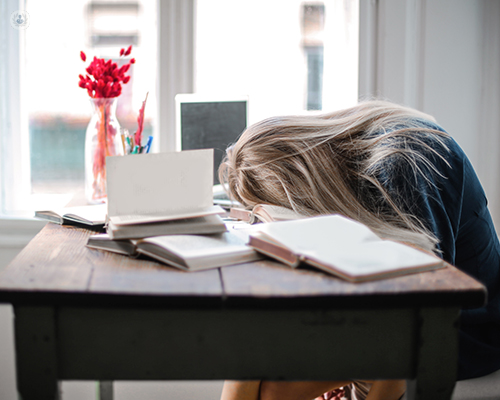Frequently asked questions about insomnia
Escrito por:What is insomnia?
Insomnia is a condition where a person has difficulties with falling asleep and staying asleep, which results in them getting less sleep than they require, despite having enough time to sleep and a bedroom environment which provides adequate opportunity to sleep.
Chronic insomnia is diagnosed when the sleep disturbance takes place 3 times a week and has been occurring for at least 3 months.
There are a various symptoms associated with insomnia.

What are the causes of insomnia?
There are many reasons why someone might develop insomnia. Insomnia may be caused by stressful life events or inadequate sleep hygiene. It may also occur due to regular disturbance from a bed partner, for example because of snoring, amongst other factors.
Is important to note that consuming substances such as caffeine, nicotine and alcohol in a particular way can result in insomnia.
Insomnia may also take place if the patient is suffering from other mental health conditions such as anxiety, physical health conditions or another sleep condition.
Furthermore, insomnia can develop due to certain medications and some people can develop insomnia because they have a very active mind with racing thoughts at night. As a result, they struggle to relax and “switch off”.
What are the different types of insomnia?
There are 2 main types of insomnia; chronic insomnia and short-term insomnia.
Chronic insomnia is insomnia which has been present for more than 3 consecutive months, while short-term insomnia often occurs in episodes, and lasts for less than 3 consecutive months.
How is insomnia diagnosed?
Insomnia cannot be diagnosed from a specific test. Insomnia is 1 of over 70 different sleeping disorders, therefore patients should undergo an assessment with a sleep specialist who can check for and rule out other sleep conditions.
Sleep apnoea is a common sleep disorder which can also result in a person feeling sleepy and tired during the day, therefore this could be confused with insomnia.
What are some common symptoms of insomnia?
People suffering from insomnia often feel tired and sleepy during the day. They may yawn frequently and have low energy levels. Those suffering from insomnia also often struggle to maintain focus and attention for prolonged periods of time. As a result, work and studies can be negatively affected.
Other symptoms which sufferers may experience include brain fog, fatigue, irritability and in some cases, mood disturbance. As a consequence of this, there may be a negative impact on social and personal relationships. Due to the fact that they constantly feel drained, they may start to withdraw from social engagements, due to feeling constantly drained which again, can impact personal relationships.
If you are suffering from insomnia and would like to book a consultation with Dr Mistr, simply visit his Top Doctors profile today.


